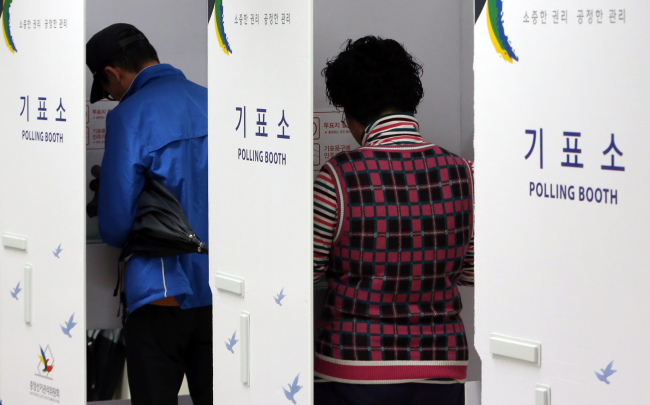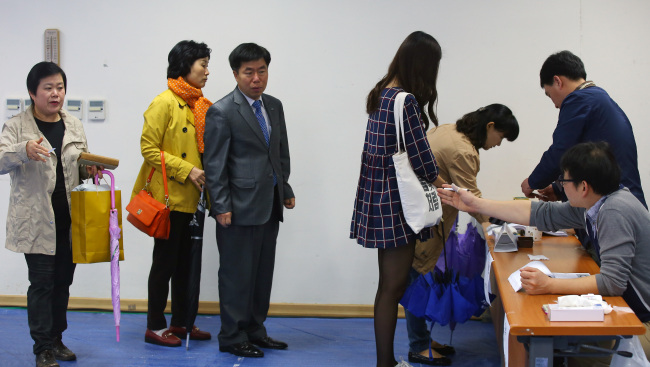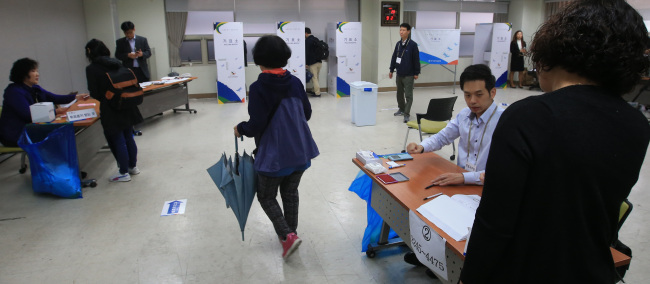South Korean voters in four parliamentary constituencies headed to polling stations in four cities on a drizzly Wednesday, in elections marred by a graft scandal and viewed to be the foretaste for next year’s general elections.
 |
| Voters cast their ballots during a National Assembly by-election at Gwanak-gu Community Service Center, Seoul, Wednesday. Yonhap |
Voters were set to pick new Assembly representatives in Seoul, Incheon, Gwangju, and Seongnam, Gyeonggi Province. Seoul’s Gwanak district was the most highly contested, according to recent polls.
By 2 p.m., voter turnout reached 176,266, or 24.7 percent, according to the National Election Commission.
The parliamentary polls to fill the seats — vacated by now-defunct leftist party members and a convicted Saenuri Party member — would set the tone for future talks on various reform agendas pursued by the Park Geun-hye administration and the ruling Saenuri Party, analysts said.
It was also considered a turning point for the escalating political tug-of-war over the scandal involving Park’s key aides, to whom a dead businessman claimed to have given unlisted campaign money.
 |
| Voters line up to cast their ballots in Seoul on Wednesday. Yonhap |
The scandal has hurt the president’s approval ratings, led to the resignation of the prime minister and halted legislative work in the National Assembly.
Some of the bills pushed by Park and the ruling party include one aiming to invigorate crowd-funding in South Korea’s conservative business culture and another draft amendment targeting the public service pension, a source the ruling bloc has blamed for snowballing the national debt.
“The election will not change the majority party. Nor will it change the president’s attitude,” said Chung-Ang University professor Choi Young-jin. “But whichever party wins will be able to use the electoral results to justify their policy agenda by arguing that voters were on their side.”
 |
| Voters cast their ballots in Seoul on Wednesday. Yonhap |
With the voter turnout remaining relatively high as of the afternoon, many showed determination to cast their votes to channel their frustration at political backbiting.
“I’m tired of the (constant fight). It’s time for a change,” said one 63-year-old citizen, who wished to remain anonymous.
Another voter in her 40s said, “I think it’s time we show (what we really think),” as she exited a booth in Gwanak.
The Gwanak district was formerly held by Lee Sang-gyu, an ex-lawmaker who had represented the now-dissolved minor opposition Unified Progressive Party.
One of the most heated competition took place at Gwangju, the traditional foothold for the liberals. The seat was heavily contested by opposition-turned-independent Chun Jung-bae, Jung Seung of the Saenuri Party and Cho Young-teck of the main opposition New Political Alliance for Democracy, among others.
Despite the heavy political tit-for-tat over the Sung Woan-jong scandal, observers said the impact would be lower than anticipated.
Sung, a construction mogul, claimed earlier this month to have given illegal campaign funds to Saenuri officials close to Park since 2007 including former Prime Minister Lee Wan-koo. The president approved Lee’s resignation Monday.
Analysts cautioned that it would be difficult to attach “much meaning” to the polls.
“I think the media is under pressure to attach some kind of meaning to this election,” Choi said. “And I understand that. But I think this election will not have as much an impact as the media has been saying.”
“If you take out Gwangju, an area the opposition is fighting over amongst themselves, there are only three districts the ruling and opposition blocs are contesting,” said Yoon Pyung-joong, professor at Hanshin University.
“That means it will be difficult to read public opinion on the Park administration.”
However, Yoon said, the election was a chance for NPAD chair Rep. Moon Jae-in to create his own political image.
“Moon has always been viewed as a Roh lieutenant,” Yoon said in reference to former President Roh Moo-hyun. “That image of being under Roh’s shadow has always been a weakness to Moon.
“This election will be a chance for him to accelerate his creation of a new, original image for himself.”
Moon served as Roh’s chief of staff and secretary before running in the 2012 presidential race against Park. Analysts view Moon as a leading opposition candidate in the 2017 presidential election.
A win for the Saenuri Party leader Rep. Kim Moo-sung, on the other hand, was considered to be a turning point for the heavyweight to expand his clout within the conservative party as an alternative force to the mainstream pro-Parks, the pundits said.
By Jeong Hunny and Yeo Jun-seok (hj257@heraldcorp.com) (jasonyeo@heraldcorp.com)

